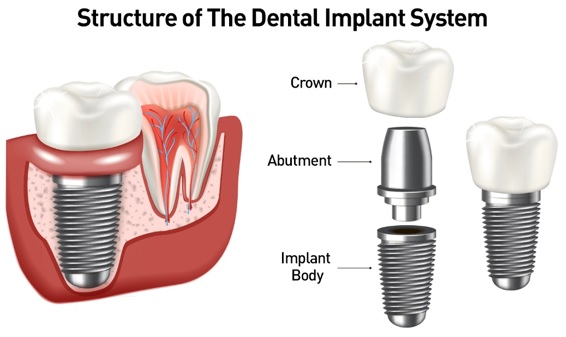The ideal candidate for dental implants is someone who meets certain criteria that ensure a higher likelihood of successful implantation. While each case is unique and should be evaluated by a dental professional, here are some general factors that make a person a good candidate for dental implants:
Sufficient Jawbone Density: Dental implants require a certain amount of healthy jawbone to support and integrate with the implant. Sufficient bone density ensures stability and longevity of the implant. However, if the jawbone has experienced significant deterioration, bone grafting procedures may be necessary to augment the bone volume before implant placement.
Good Oral Health: Candidates should have a generally healthy oral condition, including healthy gums and no active periodontal (gum) disease. Any existing oral health issues, such as gum disease or tooth decay, should be addressed and resolved before proceeding with dental implant surgery.
Overall Good Health: Candidates should be in good overall health, as certain medical conditions or medications may affect the healing process after implant surgery. It's important to inform your dentist about any medical conditions, medications, or habits (such as smoking) that may impact the success of the implant.
Commitment to Oral Hygiene: Maintaining proper oral hygiene is crucial for the long-term success of dental implants. Candidates should be willing to follow a thorough oral care routine, including regular brushing, flossing, and dental check-ups. Good oral hygiene helps prevent complications such as infection and peri-implantitis (inflammation around the implant).
Non-Smoker or Willingness to Quit Smoking: Smoking has been linked to a higher risk of implant failure and complications. Tobacco use can compromise the healing process and increase the likelihood of infections. Ideally, candidates should be non-smokers or willing to quit smoking for the best chances of success with dental implants.
Stable Dental Occlusion: Candidates should have a stable bite and a healthy occlusion (how the teeth come together) to ensure even distribution of forces during chewing. Any existing bite or occlusal issues may need to be addressed before implant placement.

Understanding the Dental Implant Process
Your dentist will guide you on the optimal approach for placing dental implants. While there are cases where the implant and crown can be installed on the same day, the typical procedure spans multiple appointments over several months.
In the initial phase, during the surgical implant placement, local anesthesia or IV sedation is administered to ensure a pain-free experience. A cut is made in the gums to position the implant in the jawbone where the missing tooth was. The gums are then closed over the implant, concealing it during the healing process.
Following this phase, you'll recover at home, returning for the second stage after a few months. This allows time for osseointegration, where the bone fuses with the implant, providing the necessary strength. The duration of healing varies among individuals, ranging up to six months before replacement teeth can be inserted, though some cases allow for a single appointment.
Upon examination to confirm the implant's stability, the dentist attaches an abutment to the implant's post, serving as the foundation for the new tooth. Once your gums have healed, impressions are taken for the custom replacement tooth, or crown, which is then affixed to the abutment.
Recovery After a Dental Implant Procedure
If IV sedation is used, you may feel groggy for a few hours. Post-implant placement, expect some bruising, swelling, minor bleeding, and discomfort. Soft foods, cold items, and warm soup are recommended during the initial healing period. Over-the-counter medications, such as Advil (ibuprofen), may be suggested for pain management.Long-Term Care Maintaining dental implants involves regular oral hygiene practices—brushing your teeth twice daily, flossing, and attending routine dentist appointments. While dental implants don't experience tooth decay, they can be affected by periodontal disease, emphasizing the importance of consistent dental care.
To Summarize
In a dental implant procedure, artificial tooth roots are surgically placed in the jaw, fusing with the bone to support replacement teeth. The process involves multiple appointments, starting with a consultation, followed by implant placement, and, after a few months, the insertion of replacement teeth. Local anesthesia or IV sedation is administered during the procedure, and post-treatment care includes managing potential discomfort and adhering to long-term dental hygiene practices.What is the next step if I am interested in dental implants?
It's important to consult with a qualified dental professional, such as a dentist or oral surgeon, who will conduct a thorough examination and discuss your specific situation. They will evaluate your oral health, assess your jawbone density, and determine if dental implants are a suitable option for you. Dr Bruce Huberman offers free appointmets for patients looking for dental implants.
If you are looking to make an appointment with please call us or request an appointment by clicking the 'appointment button' above or below.


